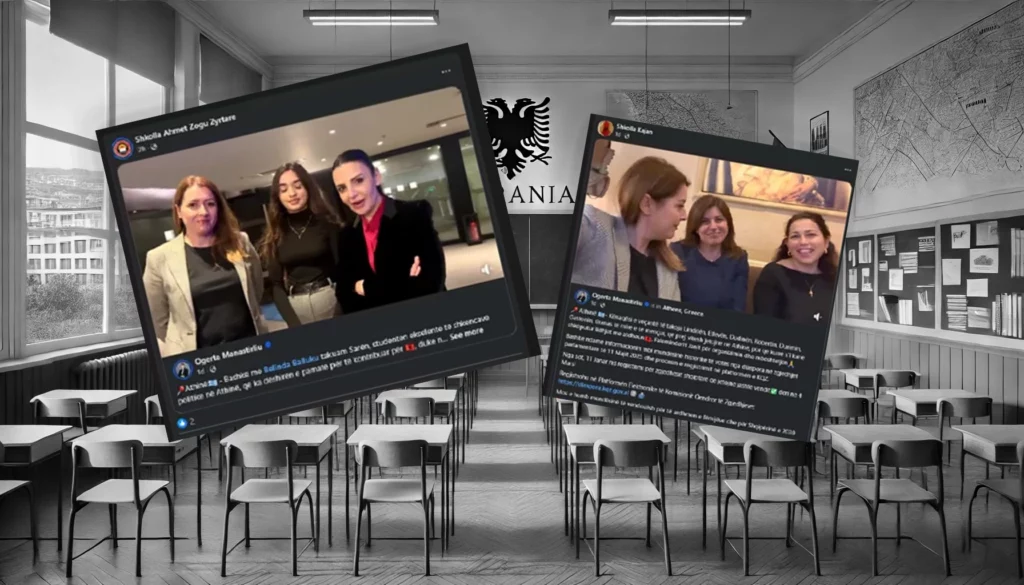On January 13, ‘Qëndresa Qytetare (Civic resistance)‘ organization filed a complaint with the Central Election Commission against 36 educational institutions, claiming they used their official pages for electoral purposes.
The complaint states that some schools had shared on Facebook a meeting with the Minister of Education and Sports, Ogerta Manastirliu, as part of the election campaign.


Some of the posts shared by the schools
A post from Minister Manastirliu, published on January 11 this year, was about a meeting held in Greece as part of the upcoming elections on May 11.
‘Athens – Along with Belinda Balluku, we met Sara, an excellent political science student in Athens, who has a great passion for contributing to Albania, starting with her first vote and continuing to collaborate on the vision for #Shqipërisë2030,’ Manastirliu wrote on Facebook.
Faktoje.al carried out a verification of the official pages of schools and other educational institutions mentioned in the complaint submitted to the CEC.
The observation showed that the schools had deleted the electoral post, and some had even removed other posts related to Manastirliu during January. Specifically, the ‘Neim Muçelli’ in Pretushë, ‘Ismail Jangulli‘ in Godvi, ‘Koli Dimo’ in Frashër, ‘Koli Sako’ schools, Kajan school (Jashar Dunga), the 9-year school ‘Alush Grepcka‘, and the 9-year school ‘Ahmet Zogu‘.
However, some other educational institutions continue to share posts from Minister Manastirliu, excluding those of a political nature.
How was the sharing of electoral posts justified?
On January 27, during a meeting held on the issue by the State Election Commissioner, school representatives explained that the posts were deleted because their sharing had been accidental, with no political purpose.
‘It was a post made by an administrator from our school. There is no political agenda behind it, just a mistake, a mistake that wasn’t in line with the legal framework the law requires. The main administrator of the page is not part of the educational system but is an external individual,’ said the head of the 9-year school ‘Ismail Jangulli‘ in Godvi.
The director of the 9-year school ‘Mustafa Greblleshi’ in Tirana explained that she had mistakenly confused her personal social media account with the school’s official one.
‘As soon as I was notified via email by the Local Education Office, I logged into the school’s account and saw that I had liked the post. This was done unknowingly because I keep two accounts on my phone—one personal and one for the school. The confusion was unintentional, and I was not influenced or pushed by anyone to make posts of this nature,’ she said.
‘Qëndresa Qytetare’ organization stated that this issue must be addressed urgently. ‘Educational institutions cannot be tools for government propaganda at any point during the year, especially not during pre-election or election periods.’
Article 91 of the Electoral Code states: ‘Except when otherwise provided by law, resources of central or local public bodies or entities, or of any other type of entity in which the state holds capital or shares or/and appoints the majority of the supervisory or administrative body of the entity, regardless of the source of the capital or ownership/
Under this article, ‘resources’ are defined as movable and immovable assets as outlined in Article 142 of the Civil Code, as well as any human resources of the institution. The term ‘human resources’ refers to the mandatory use of the institution’s administrative staff during working hours for electoral purposes, as well as the compulsory and organized use of students from the pre-university education system during school hours for electoral campaigning.
The use of human resources also involves the promise or offering of benefits to public employees or students to participate in activities related to the electoral campaign outside of working or school hours, as well as exerting pressure on them for this purpose.’










